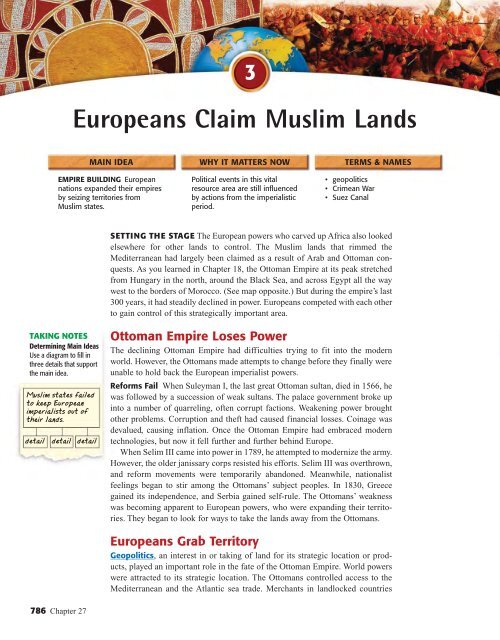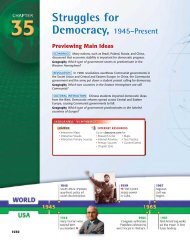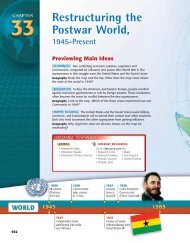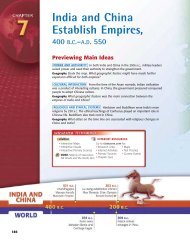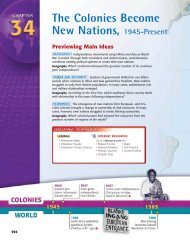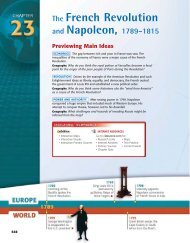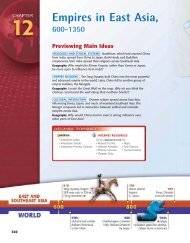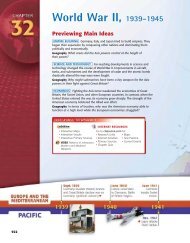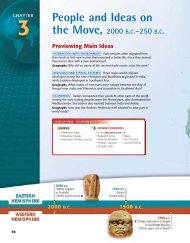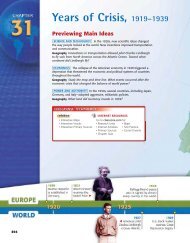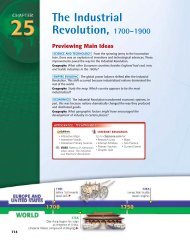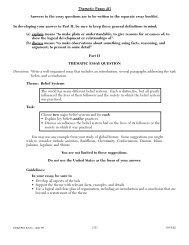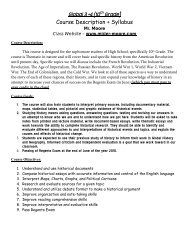The Age of Imperialism, - First
The Age of Imperialism, - First
The Age of Imperialism, - First
You also want an ePaper? Increase the reach of your titles
YUMPU automatically turns print PDFs into web optimized ePapers that Google loves.
786 Chapter 27<br />
MAIN IDEA WHY IT MATTERS NOW TERMS & NAMES<br />
EMPIRE BUILDING European<br />
nations expanded their empires<br />
by seizing territories from<br />
Muslim states.<br />
TAKING NOTES<br />
Determining Main Ideas<br />
Use a diagram to fill in<br />
three details that support<br />
the main idea.<br />
Muslim states failed<br />
to keep European<br />
imperialists out <strong>of</strong><br />
their lands.<br />
detail detail<br />
detail<br />
Europeans Claim Muslim Lands<br />
3<br />
Political events in this vital<br />
resource area are still influenced<br />
by actions from the imperialistic<br />
period.<br />
• geopolitics<br />
• Crimean War<br />
• Suez Canal<br />
SETTING THE STAGE <strong>The</strong> European powers who carved up Africa also looked<br />
elsewhere for other lands to control. <strong>The</strong> Muslim lands that rimmed the<br />
Mediterranean had largely been claimed as a result <strong>of</strong> Arab and Ottoman conquests.<br />
As you learned in Chapter 18, the Ottoman Empire at its peak stretched<br />
from Hungary in the north, around the Black Sea, and across Egypt all the way<br />
west to the borders <strong>of</strong> Morocco. (See map opposite.) But during the empire’s last<br />
300 years, it had steadily declined in power. Europeans competed with each other<br />
to gain control <strong>of</strong> this strategically important area.<br />
Ottoman Empire Loses Power<br />
<strong>The</strong> declining Ottoman Empire had difficulties trying to fit into the modern<br />
world. However, the Ottomans made attempts to change before they finally were<br />
unable to hold back the European imperialist powers.<br />
Reforms Fail When Suleyman I, the last great Ottoman sultan, died in 1566, he<br />
was followed by a succession <strong>of</strong> weak sultans. <strong>The</strong> palace government broke up<br />
into a number <strong>of</strong> quarreling, <strong>of</strong>ten corrupt factions. Weakening power brought<br />
other problems. Corruption and theft had caused financial losses. Coinage was<br />
devalued, causing inflation. Once the Ottoman Empire had embraced modern<br />
technologies, but now it fell further and further behind Europe.<br />
When Selim III came into power in 1789, he attempted to modernize the army.<br />
However, the older janissary corps resisted his efforts. Selim III was overthrown,<br />
and reform movements were temporarily abandoned. Meanwhile, nationalist<br />
feelings began to stir among the Ottomans’ subject peoples. In 1830, Greece<br />
gained its independence, and Serbia gained self-rule. <strong>The</strong> Ottomans’ weakness<br />
was becoming apparent to European powers, who were expanding their territories.<br />
<strong>The</strong>y began to look for ways to take the lands away from the Ottomans.<br />
Europeans Grab Territory<br />
Geopolitics, an interest in or taking <strong>of</strong> land for its strategic location or products,<br />
played an important role in the fate <strong>of</strong> the Ottoman Empire. World powers<br />
were attracted to its strategic location. <strong>The</strong> Ottomans controlled access to the<br />
Mediterranean and the Atlantic sea trade. Merchants in landlocked countries


